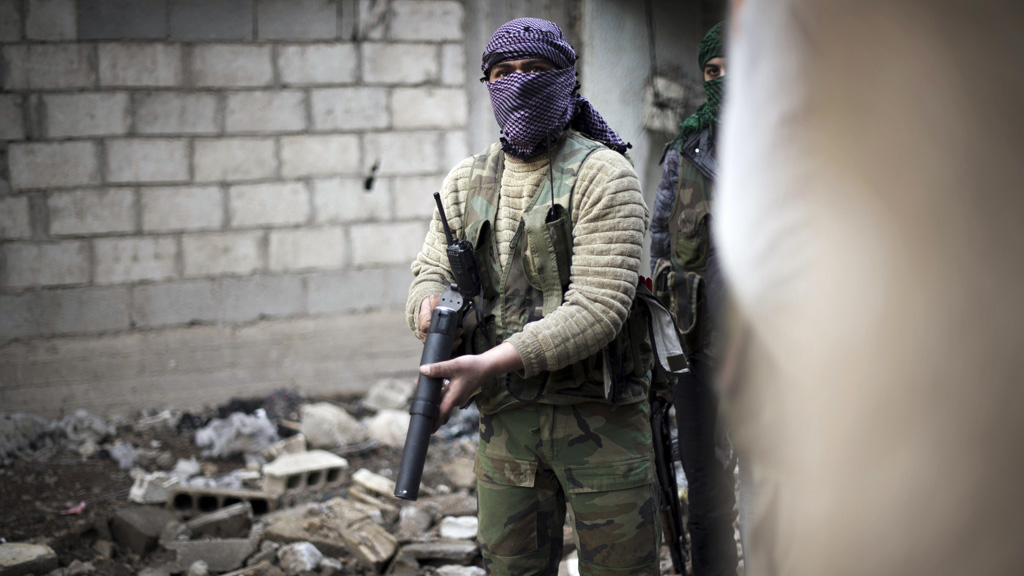UK public opposes government’s aim to arm Syrian rebels
 Lindsey Hilsum
International Editor
Lindsey Hilsum
International Editor
A decade since the war in Iraq, a YouGov poll reveals half the British people are against giving Syria’s rebels any military hardware whatsoever.

On Friday British and French foreign ministers will try to persuade their EU colleagues to lift the arms embargo against Syria, to permit the supply of lethal equipment to forces battling the regime of Bashar al-Assad. Other EU ministers, including Germany, are likely to oppose the measure as they meet in Dublin.
The move would be controversial in the UK too. An opinion poll by YouGov for Channel 4 News found that half of British people surveyed opposed sending defensive military supplies such as anti-aircraft guns to anti-Assad troops.
Sixty-four per cent were against providing full-scale military equipment such as tanks and heavy artillery. The French public was also opposed, although less decisively, with 39 per cent against sending defensive supplies and 31 per cent in favour. Forty-six percent opposed sending heavier weapons.
Read more: Channel 4 News reports from Syria
The survey highlights the unpopularity of deeper involvement in the conflict, even though the British government believes further intervention, short of sending British troops, is essential. According to the UN, 70,000 Syrians have been killed in the last three years.
“What we face is not a choice between diplomacy on the one hand and practical assistance on the other,” said Foreign Secretary William Hague to parliament last week. “Helping the opposition is crucial to bringing about a political transition and saving lives, and both must be pursued together.”
Even those who favour lifting the embargo accept that providing weapons is risky.

“Supplying arms in a civil war will always be controversial and in the short term would lead to greater fighting and more deaths,” wrote former Foreign Secretary Malcolm Rifkind in the New York Times. “But it would also ensure the collapse of the Assad regime in weeks rather than months.”
That seems highly optimistic.
Despite the defection of several senior officers, the Syrian army remains loyal to President Assad. The opposition is increasingly fractured – Channel 4 News has listed 1,200 rebel groups, and more are emerging every day. Many of the new groups are jihadis, who want not only to overthrow Assad but also to turn Syria into an Islamist state.
The British and French governments fear that if they don’t arm the “moderate” non-jihadi oppositon, the extremists will dominate, but the danger is that British and French arms would fall into jihadi hands.
President Obama has suggested that the US might intervene forcefully if President Assad deploys chemical weapons. Today the UN Secretary General, Ban Ki-Moon, announced an investigation into an incident near Aleppo on Tuesday in which 26 people died, allegedly after an unknown substance was delivered by rocket. Rebels and government are blaming the other.
More from Channel 4 News: Iraq war 10 years on
The debacles in Iraq and Afghanistan, and continuing instability in Libya after the Nato intervention that ended in the overthrow of Colonel Gaddafi, may have turned the British public against involvement in wars in the Middle East and beyond. Alternatively, people may feel that Syria is so complex, and the conflict so fragmented, that intervention could end up having the opposite effect than intended.
Tonight an appeal by the Disasters Emergency Committee will ask for donations for the growing numbers of refugees and displaced people fleeing the fighting in Syria. The YouGov/Channel 4 News poll suggests that three-quarters of British people, and 71 per cent of French, support sending food, medicine and other humanitarian supplies to civilians.
That seems to be all the public feels we can or should do.